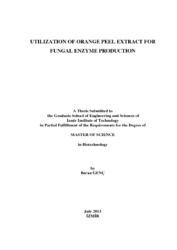Please use this identifier to cite or link to this item:
https://hdl.handle.net/11147/3584Full metadata record
| DC Field | Value | Language |
|---|---|---|
| dc.contributor.advisor | Büyükkileci, Ali Oğuz | en |
| dc.contributor.author | Genç, Berna | - |
| dc.date.accessioned | 2014-07-22T13:51:52Z | - |
| dc.date.available | 2014-07-22T13:51:52Z | - |
| dc.date.issued | 2013 | en |
| dc.identifier.uri | http://hdl.handle.net/11147/3584 | - |
| dc.description | Thesis (Master)--Izmir Institute of Technology, Biotechnology, Izmir, 2013 | en |
| dc.description | Includes bibliographical references (leaves 66-71) | en |
| dc.description | Text in English; Abstract: Turkish and English | en |
| dc.description | xi, 75 leaves | en |
| dc.description | Full text release delayed at author's request until 2015.07.23 | en |
| dc.description.abstract | Pectinases are a group of hydrolytic enzymes that degrade pectic substances and produced by a variety of microorganisms including filamentous fungi. In previous studies orange peel especially in solid state fermentations was utilized as a source of additional sugars and nutrients. In this study, orange peel, an agro industrial residue was used for exo-polygalacturonase (exo-PG) production in submerged fermentation (SmF) by Aspergillus sojae which have been shown to be a potential exo-polygalacturonase producer. Solubilization of carbohydrates within orange peel was provided by water extraction and treatment with dilute phosphoric (at 0.4% acid concentration and 120 oC in 20 min.) and sulfuric (at 0.5% acid concentration and 116 oC in 13 min.) acid hydrolysis. Phosphoric acid hydrolysis was optimized selecting temperature (oC), time (min.) and acid concentration (v/v %) as variable factors, while reducing sugar concentration (gL-1) was the response factor. Two different dilute acid hydrolysis (at 0.4 % phosphoric acid concentration and 120 0C in 20 min and at 0.5 % sulfuric acid concentration and 116 0C in 13 min.) and water extraction were carried out to obtain media that were utilized for enzyme productions. A.sojae ATCC 20235 and mutant A.sojae strains were used to produce exo-PG in these hydrolysates and water extract of orange peel. To enhance exo-PG production, trace element solutions added as well as macro nutrients. Pellet size, number, density, pH and spore inoculation of fermentation were the other parameters that were controlled during fermentations. The highest exo-PG production was 18.4 UmL-1, which was obtained by mutant A.sojae in phosphoric acid hydrolysate but on the other hand mutant A.sojae produced 19.7 UmL-1 exo-PG activities in water extract of orange peel. | en |
| dc.language.iso | en | en_US |
| dc.publisher | Izmir Institute of Technology | en |
| dc.rights | info:eu-repo/semantics/openAccess | en_US |
| dc.subject.lcsh | Fungi--Biotechnology | en |
| dc.subject.lcsh | Fungal enzymes | en |
| dc.subject.lcsh | Fungal enzymes--Utilization | en |
| dc.title | Utilization of organce peel extract for fungal enzyme production | en_US |
| dc.type | Master Thesis | en_US |
| dc.authorid | Genç, Berna | - |
| dc.institutionauthor | Genç, Berna | - |
| dc.department | Thesis (Master)--İzmir Institute of Technology, Bioengineering | en_US |
| dc.relation.publicationcategory | Tez | en_US |
| item.languageiso639-1 | en | - |
| item.fulltext | With Fulltext | - |
| item.openairecristype | http://purl.org/coar/resource_type/c_18cf | - |
| item.openairetype | Master Thesis | - |
| item.grantfulltext | open | - |
| item.cerifentitytype | Publications | - |
| Appears in Collections: | Master Degree / Yüksek Lisans Tezleri | |
Files in This Item:
| File | Description | Size | Format | |
|---|---|---|---|---|
| 10009350.pdf | MasterThesis | 1.77 MB | Adobe PDF |  View/Open |
CORE Recommender
Page view(s)
90
checked on Jul 22, 2024
Download(s)
80
checked on Jul 22, 2024
Google ScholarTM
Check
Items in GCRIS Repository are protected by copyright, with all rights reserved, unless otherwise indicated.